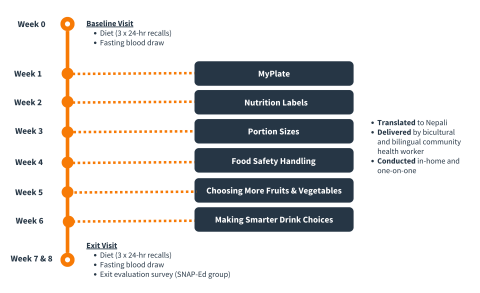Key Findings
As currently structured, the SNAP-Ed program, which provides nutrition education to resource-limited people, did not significantly improve the dietary quality or cardiometabolic risk profiles of Bhutanese refugee adults.
Bhutanese refugee adults who consumed more fruits and whole grains showed better inflammatory and lipid profiles.
Cultural tailoring of SNAP-Ed interventions to emphasize fruits and a balance of whole and refined grains may be more effective in improving the health of Bhutanese refugee adults compared to general dietary recommendations.
About the Co-Author
Sherman Bigornia, Assistant Professor of Agriculture, Nutrition and Food Systems
Contact information: Sherman.Bigornia@unh.edu
This research was published in the INSPIRED: A Publication of the New Hampshire Agricultural Experiment Station (Summer/Fall 2023)
Researchers: D. Moore and S. Bigornia
Bhutanese refugees are one of the fastest-growing populations in the U.S., with approximately 100,000 ethnically Nepali Bhutanese displaced from Bhutan during the early 1990s. Around 80,000 Bhutanese refugees have resettled in the United States since 2008. In New Hampshire, Bhutanese refugees comprise one of the largest refugee populations in the state. These refugees, like many South Asian immigrants, face higher-than-average rates of chronic diseases, including cardiovascular disease and type 2 diabetes, compared to other racial/ethnic groups. The objective of this pilot study was to evaluate the potential benefits of SNAP-Ed on the dietary quality and risk of chronic diseases among Bhutanese refugee adults residing in the Granite State. The ultimate aim is to enhance their overall health outcomes by implementing culturally tailored interventions.
What is the SNAP-Ed program?
The SNAP-Ed program focuses on providing nutrition education and assistance to low-income individuals and families to promote healthier dietary habits. In this study, Bhutanese refugee adults in New Hampshire were randomly assigned to either receive no SNAP-Ed intervention (control group) or participate in a 7-week program with six in-home nutrition lessons (Fig. 1). The lessons covered topics such as healthy eating using MyPlate, understanding nutrition labels, portion sizes, food safety handling, choosing more fruits and vegetables and making smart drink choices. These lessons align with the U.S. Dietary Guidelines andenhance dietary quality among participants.
Methodology
In partnership with Building Community in New Hampshire (BCNH), a non-profit organization supporting refugee communities, the researchers enlisted Bhutanese refugee adults residing in New Hampshire. Through random assignment, participants were divided into two groups: the control group receiving no SNAP-Ed programming and the SNAP-Ed study group, which underwent a series of 6 SNAP-Ed lessons delivered in their homes. The investigators wanted to test the efficacy of SNAP-Ed as currently being delivered to Bhutnaese refugee adults. These lessons were based on North Carolina’s Families Eating Smart and Moving More curriculum.
Data collection occurred at the beginning of the study and after 6–7 weeks. Three 24-hour dietary recalls and fasting blood samples were obtained to assess cardiometabolic risk factors like insulin resistance, dyslipidemia and inflammation. Additionally, participants receiving SNAP-Ed programming completed a brief evaluation survey, providing valuable feedback on the program’s effectiveness.
Figure 1. Study design for understanding whether SNAP-Ed, as currently implemented, could improve dietary quality and biomarkers of risk in the short-term.

Figure 1. Study design for understanding whether SNAP-Ed, as currently implemented, could improve dietary quality and biomarkers of risk in the short-term.
All interactions, including recruitment, consent, study visits and nutrition education, were conducted in Nepali by a community health worker who shared the same Bhutanese refugee background as the participants. The curriculum was translated to the native language, Nepali, and some food images in lessons were replaced with traditional dishes, but no cultural tailoring was otherwise done. For analysis, the researchers utilized the Healthy Eating Index to evaluate dietary quality, with higher scores indicating better adherence to U.S. Dietary Guidelines.
Key Findings and Significance
The study observed that despite a high level of participant satisfaction with the SNAP-Ed program, there was no significant improvement in dietary quality or cardiometabolic risk profiles among Bhutanese refugee adults in New Hampshire (Fig. 2). Notably, the Making Smart Drink Choices lesson received the least favorable response, possibly attributed to the fact that most participants were already meeting the guidelines for added sugar intake. Additionally, while more than 90% of participants met the recommended levels for vegetable and saturated fat consumption, less than 13% adhered to guidelines for fruits, whole grains and refined grains. Observational analyses revealed that individuals who consumed more fruits and whole grains demonstrated better inflammatory and lipid profiles, respectively.
Figure 2. Study findings support that SNAP-Ed, as currently implemented, may not improve dietary quality and biomarkers of risk in the short-term.

Figure 2. Study findings support that SNAP-Ed, as currently implemented, may not improve dietary quality and biomarkers of risk in the short-term.
The findings suggest that the current implementation of SNAP-Ed may not be effective in improving the dietary habits and cardiometabolic health of Bhutanese refugees in New Hampshire. They also underscore the potential benefits of cultural tailoring in enhancing the program’s impact. By focusing on promoting fruit consumption and striking the right balance between whole and refined grain intake, tailored interventions may hold the key to improving the health outcomes of this population. Understanding the specific dietary aspects that require attention, especially those where current guidelines are not being met, can aid in developing more targeted and effective interventions.
These results shed light on the challenges and opportunities in addressing the unique health characteristics and dietary behaviors of the Bhutanese refugee population. By highlighting the potential benefits of cultural tailoring, the study contributes valuable insights for future interventions aimed at improving the health and well-being of this vulnerable community. Moreover, the research emphasizes the need for ongoing evaluation and refinement of nutrition education programs like SNAP-Ed to ensure they are impactful and relevant to the diverse needs of different populations. Ultimately, this study serves as a steppingstone toward fostering better health outcomes and promoting health equity among Bhutanese refugees in New Hampshire and potentially other similar communities.
Related Published Research:
Moore, D. (2021). Efficacy of SNAP Education and Associations Between Diet Quality and Chronic Disease Risk in Bhutanese Refugees (Master’s thesis). University of New Hampshire, Durham, NH. Retrieved from https://scholars.unh.edu/cgi/viewcontent.cgi?article=2559&context=thesis


